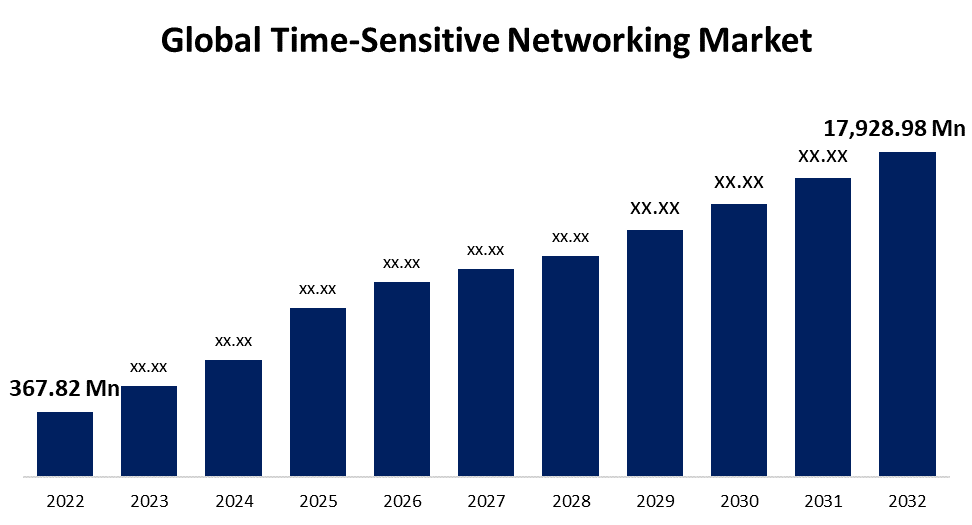Global Time-Sensitive Networking Market Size, Share, and COVID-19 Impact Analysis, By Component (Solution and Services), By Application (Industrial Automation, Power & Energy, Automotive & Transportation, Oil & Gas, Aerospace, and Others), By Region (North America, Europe, Asia-Pacific, Latin America, Middle East, and Africa), Analysis and Forecast 2022 - 2032.
Industry: Electronics, ICT & MediaGlobal Time-Sensitive Networking Market Insights Forecasts to 2032
- The Time-sensitive Networking Market Size was valued at USD 367.82 Million in 2022.
- The Market is Growing at a CAGR of 47.5% from 2022 to 2032
- The Worldwide Time-sensitive Networking Market Size is expected to reach USD 17,928.98 Million by 2032
- Europe is Expected to Grow the fastest during the forecast period

Get more details on this report -
The Global Time-sensitive Networking Market Size is expected to reach USD 17,928.98 Million by 2032, at a CAGR of 47.5% during the forecast period 2022 to 2032.
Market Overview
Time-Sensitive Networking (TSN) is a set of Ethernet-based networking standards designed to enable deterministic and time-critical communication in industrial automation and other time-sensitive applications. TSN ensures reliable and predictable data transmission by introducing synchronization and scheduling mechanisms into standard Ethernet networks. By providing precise time synchronization, TSN allows for synchronized operation of distributed devices and systems. It also incorporates mechanisms like traffic shaping, redundancy, and fault tolerance to guarantee real-time communication and prevent packet loss or network congestion. TSN supports multiple traffic classes with different levels of priority, enabling the coexistence of critical control data and best-effort traffic on the same network infrastructure. With its ability to deliver high-performance, low-latency, and deterministic communication, TSN plays a crucial role in industries where precise timing and synchronization are essential for achieving efficient and safe operations.
Report Coverage
This research report categorizes the market for time-sensitive networking market based on various segments and regions and forecasts revenue growth and analyzes trends in each submarket. The report analyses the key growth drivers, opportunities, and challenges influencing the time-sensitive networking market. Recent market developments and competitive strategies such as expansion, product launch, and development, partnership, merger, and acquisition have been included to draw the competitive landscape in the market. The report strategically identifies and profiles the key market players and analyses their core competencies in each sub-segments of the time-sensitive networking market.
Global Time-Sensitive Networking Market Report Coverage
| Report Coverage | Details |
|---|---|
| Base Year: | 2022 |
| Market Size in 2022: | USD 367.82 Million |
| Forecast Period: | 2022-2032 |
| Forecast Period CAGR 2022-2032 : | 47.5% |
| 2032 Value Projection: | USD 17,928.98 Million |
| Historical Data for: | 2018-2021 |
| No. of Pages: | 200 |
| Tables, Charts & Figures: | 120 |
| Segments covered: | By Component, By Application, By Region. |
| Companies covered:: | Analog Devices, Inc., Broadcom Limited, Belden, Inc., Cisco Systems, Inc., Microsemi Corporation, Marvell Technology Group Ltd., Nokia Corporation, Inc., Renesas Electronics Corporation, TTTech Computertechnik AG., NXP Semiconductors, Intel Corporation, Xilinx, National Instruments, Bosch Rexroth, Rockwell Automation, Inc., Schneider Electric, Harman International. |
| Pitfalls & Challenges: | COVID-19 Empact, Challenge, Future, Growth, & Analysis |
Get more details on this report -
Driving Factors
The Time-Sensitive Networking (TSN) market has witnessed significant growth in recent years, driven by several factors that have contributed to the increasing adoption of TSN technology across various industries. One of the primary drivers of the TSN market is the growing demand for real-time and deterministic communication in critical applications such as industrial automation, automotive, aerospace, and healthcare. The increasing need for high-bandwidth, low-latency, and secure communication in mission-critical environments is driving the demand for TSN solutions. Another key driver of the TSN market is the proliferation of connected devices and the Internet of Things (IoT), which is generating massive amounts of data that require precise and efficient transmission. TSN's ability to support various traffic classes and prioritize critical data helps address the challenges of managing large-scale IoT networks. Additionally, the development of new TSN standards and protocols, the increasing investment in research and development, and the expanding range of TSN applications are also driving the growth of the TSN market. Overall, the TSN market is expected to continue its upward trajectory due to the rising demand for advanced communication and networking technologies in various industries.
Restraining Factors
While time-sensitive networking (TSN) offers numerous benefits, there are certain restraints that can impact its market growth. One significant restraint is the complexity of implementing TSN technology. Integrating TSN into existing network infrastructures may require significant investments in terms of hardware, software, and training. Additionally, ensuring interoperability between different TSN devices and standards can be challenging. Another restraint is the limited adoption of TSN in legacy systems. Many industries still rely on older, non-TSN-compatible equipment, which can hinder the widespread implementation of TSN. Furthermore, the transition from traditional industrial communication protocols to TSN may involve substantial disruption and downtime for businesses. Lastly, the cost of TSN-enabled devices and equipment can be a barrier, particularly for small and medium-sized enterprises that may have budget constraints. Overcoming these restraints requires industry collaboration, standardization efforts, and a clear migration strategy for businesses.
Market Segmentation
- In 2022, the solution segment accounted for around 72.5% market share
On the basis of component, the global time-sensitive networking market is segmented into solution and services. The solution segment is dominating with the largest market share in 2022, this can be attributed to the increasing demand for comprehensive TSN solutions that encompass hardware, software, and services. TSN solutions provide end-to-end support for implementing TSN technology, including network infrastructure, synchronization, traffic shaping, redundancy, and management tools. These solutions address the complex requirements of various industries, such as automotive, manufacturing, energy, and healthcare, where precise and deterministic communication is critical. Moreover, TSN solution providers offer expertise in integrating TSN with existing network infrastructures, ensuring interoperability, and providing support throughout the implementation process. As a result, businesses prefer comprehensive TSN solutions that offer a complete package rather than piecemeal deployment. The solution segment's market leadership is a testament to the value and convenience it brings to organizations seeking to leverage TSN technology for their time-sensitive applications.
- In 2022, the industrial automation segment dominated with more than 24.8% market share
Based on the type of application, the global time-sensitive networking market is segmented into industrial automation, power & energy, automotive & transportation, oil & gas, aerospace, and others. Out of this, the industrial automation segment is dominating the market with the largest market share in 2022, due to the widespread adoption of TSN technology in the manufacturing and process automation sectors. Industrial automation heavily relies on precise and real-time communication between machines, control systems, and sensors to optimize production processes, improve efficiency, and ensure safety. TSN's deterministic and low-latency capabilities enable synchronized and reliable communication, enabling seamless coordination of tasks, accurate data exchange, and efficient control of industrial processes. TSN helps address the challenges of integrating different systems, devices, and protocols in industrial environments. With its ability to support various traffic classes, prioritize critical data, and ensure secure communication, TSN has become a crucial technology in modern industrial automation applications. The demand for TSN in industrial automation is expected to continue growing as industries strive for greater productivity, flexibility, and connectivity in their manufacturing operations.
Regional Segment Analysis of the Time-Sensitive Networking Market
- North America (U.S., Canada, Mexico)
- Europe (Germany, France, U.K., Italy, Spain, Rest of Europe)
- Asia-Pacific (China, Japan, India, Rest of APAC)
- South America (Brazil and the Rest of South America)
- The Middle East and Africa (UAE, South Africa, Rest of MEA)
North America dominated the market with more than 35.6% revenue share in 2022.

Get more details on this report -
Based on region, North America is one of the largest markets for time-sensitive networking (TSN) due to the region's advanced industrial automation infrastructure, early adoption of TSN, and strong presence of TSN solution providers. The region has a significant concentration of industries, such as automotive, aerospace, and manufacturing, that require precise and reliable communication networks. The adoption of Industry 4.0 and the Industrial internet of things (IIoT) in these sectors has further increased the demand for TSN. Moreover, the presence of major TSN vendors, including Cisco, Intel, and National Instruments, has led to the development of advanced TSN-enabled devices and solutions in the region. Additionally, initiatives such as the industrial internet consortium (IIC) and the advanced robotics for manufacturing (ARM) consortium have facilitated the adoption of TSN in North America. Overall, the region's strong industrial infrastructure, early adoption of technology, and vibrant vendor ecosystem have made it the largest market for TSN.
Recent Developments
- In February 2023, VIAVI has launched the Near Real-Time Network Ecosystem Discovery feature on the ServiceNow Marketplace. This integration utilizes a Verified Service Graph Connector to seamlessly integrate with the ServiceNow Telecommunications Network Inventory platform. The acquisition of CanGo Networks by VIAVI serves as the underlying basis for this innovative approach.
Competitive Analysis:
The report offers the appropriate analysis of the key organizations/companies involved within the global time-sensitive networking market along with a comparative evaluation primarily based on their product offering, business overviews, geographic presence, enterprise strategies, segment market share, and SWOT analysis. The report also provides an elaborative analysis focusing on the current news and developments of the companies, which includes product development, innovations, joint ventures, partnerships, mergers & acquisitions, strategic alliances, and others. This allows for the evaluation of the overall competition within the market.
List of Companies:
- Analog Devices, Inc.
- Broadcom Limited
- Belden, Inc.
- Cisco Systems, Inc.
- Microsemi Corporation
- Marvell Technology Group Ltd.
- Nokia Corporation, Inc.
- Renesas Electronics Corporation
- TTTech Computertechnik AG.
- NXP Semiconductors
- Intel Corporation
- Xilinx
- National Instruments
- Bosch Rexroth
- Rockwell Automation, Inc.
- Schneider Electric
- Harman International
Key Target Audience
- Market Players
- Investors
- End-Users
- Government Authorities
- Consulting and Research Firm
- Venture Capitalists
- Value-Added Resellers (VARs)
Market Segment
This study forecasts revenue at global, regional, and country levels from 2019 to 2032. Spherical Insights has segmented the global time-sensitive networking market based on the below-mentioned segments:
Time-Sensitive Networking Market, By Component
- Solution
- Services
Time-Sensitive Networking Market, By Application
- Industrial Automation
- Power & Energy
- Automotive & Transportation
- Oil & Gas
- Aerospace
- Others
Time-Sensitive Networking Market, Regional Analysis
- North America
- US
- Canada
- Mexico
- Europe
- Germany
- UK
- France
- Italy
- Spain
- Russia
- Rest of Europe
- Asia Pacific
- China
- Japan
- India
- South Korea
- Australia
- Rest of Asia Pacific
- South America
- Brazil
- Argentina
- Rest of South America
- Middle East & Africa
- UAE
- Saudi Arabia
- Qatar
- South Africa
- Rest of Middle East & Africa
Need help to buy this report?